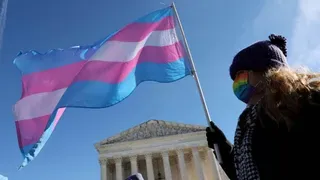October 17, 2013
CA's Gov. Brown Signs Immigrant, Youth Bills
Kilian Melloy READ TIME: 8 MIN.
Protections for people who entered the country illegally but don't have documentation and for LGBT foster youth are among the bills California Governor Jerry Brown recently signed into law. Most of the bills are effective January 1.
Among the pieces of legislation that Brown approved before the October 13 deadline was Assembly Bill 4, the Transparency and Responsibility Using State Tools Act - more commonly known as the TRUST Act.
The bill, authored by gay Assemblyman Tom Ammiano (D-San Francisco), addresses issues with the federal Immigration and Customs Enforcement agency's Secure Communities program, widely known as S-Comm. According to Ammiano, S-Comm was promoted as a way to deport dangerous criminals, but most of the 100,000 Californians forced out of the country through the program didn't meet that description.
"Some were even crime victims, leading members of some communities to avoid reporting crimes for fear of deportation," a news release from Ammiano said.
Carolina Morales is programs co-director at Community United Against Violence, a San Francisco-based nonprofit that's been critical of S-Comm. She noted the city already has a similar ordinance.
"For people in San Francisco, the TRUST Act is more about continuing to feel like we're not being punished for just being undocumented," said Morales in an interview.
Allan Martinez, a 47-year-old transgender man who lives in San Francisco but is originally from Mexico, has been afraid to call police for help in the past because of S-Comm. He didn't report incidents like abuse from his ex-girlfriend and a little girl who was being mistreated by her parents.
Among other fears, Martinez, who doesn't have legal documentation to be in the United States, said there was "the possibility of being deported." Martinez spoke to the Bay Area Reporter through Morales, who provided translation.
AB 4 prohibits law enforcement officials from detaining someone on an ICE hold after he becomes eligible for release from custody, unless that person's been convicted of a serious or violent felony such as murder or rape.
"This bill caps a great year for California's immigrant communities," Ammiano stated. "With the TRUST Act, Governor Brown is recognizing the importance of immigrants to the economy, culture and vitality of the entire state. I look forward to the nation as a whole adopting this stance."
Another Ammiano-authored bill that Brown signed into law is AB 868, which is meant to help LGBT youth who find themselves in the foster care system.
The bill requires the training necessary for court employees who work with LGBT youth to understand their experiences in the judicial system. It also requires cultural competency and sensitivity training related to providing adequate care for LGBT youth in the child welfare system.
Sherrie Wise, 52, said in an interview that the law would be helpful to people like her. Wise, who's straight, is a court-appointed special advocate in Sacramento County.
In recent years, she's worked with a 15-year-old transgender girl who's transitioning.
Wise had been through a one-night class that included training related to LGBT youth in foster care, but she felt it didn't adequately equip her for communicating with the girl. The girl had been rejected by her grandparents, and had been suspended from school for fighting, among other problems.
"Here she's already been kicked around since she was little, and now she has so many obstacles. I don't want to add to the problem. ... It was like walking in the dark," said Wise.
Scott, 38, the gay man who's in the process of adopting the girl, said the new law should cut down on the time it takes for children and care workers to get oriented with each other and increase trust. Scott, who lives in a Sacramento suburb, didn't want his last name published for fear of jeopardizing the adoption process.
AB 868 isn't the only Ammiano bill addressing the needs of youth. AB 652, which the governor also approved, takes on the reporting of child abuse and neglect as they relate to homeless youth.
Teachers and other mandated reporters are required to report cases of known or suspected child abuse. AB 652 says that the condition of homelessness alone isn't a basis for reporting abuse or neglect.
"This is important, because teens were staying away from shelters, health care and schools because they feared they would be reported to law enforcement or child welfare," a news release from Ammiano said.
The bill doesn't prevent reporting instances where there's reason to believe a child has been a victim of neglect or abuse.
Brown also signed into law AB 256, which was authored by Assemblywoman Cristina Garcia (D-Bell Gardens). The bill updates state anti-bullying law to allow school superintendents and principals to discipline students who use computers, smartphones, or social media to harass or threaten others on or off campus.
Another bill related to youth that Brown signed was gay state Senator Mark Leno's (D-San Francisco) Senate Bill 274, which is meant to protect children who have more than two legal parents. The law allows courts to recognize the rights and responsibilities of each parent if recognizing only two parents would be detrimental to the child.
"It is critical that judges have the ability to recognize the roles of all parents so that no child has to endure separation from one of the adults he or she has always known as a parent," Leno said in a statement.
Marriage, infertility
Brown also signed AB 362, which is meant to provide tax fairness for same-sex couples. The law, authored by Assemblyman Phil Ting (D-San Francisco) exempts from state income tax until 2019 any incremental increases in salary workers receive to compensate for additional federal income taxes that are incurred by the employee on employer-provided health-care benefits because, for federal income tax purposes, the same-sex spouse or domestic partner of the employee is not considered the spouse of the employee.
Ting's bill follows the U.S. Supreme Court's rulings in June that killed California's same-sex marriage ban, Proposition 8, and struck down a key section of the anti-gay federal Defense of Marriage Act.
California already exempts from state income tax calculations the value of health benefits that employers provide employees' same-sex partners and their children.
"This new law is the first of its kind to ensure that all couples are taxed equally by the state, regardless of who they love," Ting said in a statement. "It also provides same-sex couples a window of time to transition to marriage, which shows California's commitment to fairness for its lesbian, gay and bisexual residents in spite of continued federal discrimination."
AB 362 went into effect October 1.
Ammiano also authored AB 460, another bill that Brown signed. The bill guarantees non-discrimination in the provision of infertility coverage under medical insurance.
Under current law, when infertility coverage is purchased, it's subject to non-discrimination in insurance laws. However, some individuals and couples have been denied coverage because they're not heterosexual married couples, according to Ammiano's office.
Brown also signed AB 1121, from lesbian Assemblywoman Toni Atkins (D-San Diego). The law simplifies the processes people have to go through to legally change their name and gender.
Anti-trans activists are trying to overturn a different transgender-related bill that Brown signed into law. Ammiano's AB 1266 aims to make sure that transgender youth can fully participate in all school activities, sports teams, programs, and facilities that match their gender identity. Activists have until November 10 to submit at least 504,760 valid signatures to put their attempt to repeal AB 1266 on the state ballot next year.
Other bills that Brown signed include AB 446, by former Assemblywoman Holly Mitchell (D-Culver City), which is related to expanding HIV testing; AB 506, which is also by Mitchell and provides social workers with additional authority to consent to HIV testing for infants under certain circumstances; and AB 663, by Assemblyman Jimmy Gomez (D-Los Angeles), which addresses cultural competency and sensitivity training in LGBT aging issues for adult residential care facility administrators. (Mitchell is now a state senator.)
HIV/AIDS
Brown also acted on a couple of other HIV-related bills.
He signed Leno's AB 249, which aims to help people who are living with HIV, especially those in programs funded by the Ryan White HIV/AIDS Treatment Modernization Act, coordinate care as they transition to new coverage under federal health care reform. The bill also ensures the privacy of all HIV blood tests.
However, the governor vetoed AB 999, authored by Assemblyman Rob Bonta (D-Oakland). The bill would have required the California Department of Corrections and Rehabilitation to develop a plan to expand the availability of condoms to all state prisons.
In his veto message, Brown said, "The department currently allows family visitors to bring condoms for the purpose of the family overnight visitation program. While expansion of the program may be warranted, the department should evaluate and implement this expansion carefully and within its existing authority."
AIDS Healthcare Foundation, which is based in Los Angeles, criticized the governor's decision.
We are extremely disappointed that Governor Brown vetoed AB 999, a fairly prudent health measure intended to protect inmates as well as their post-incarceration partners - often, wives and girlfriends - from possible transmission of HIV and other STDs," stated AHF President Michael Weinstein.
Other bills that Brown vetoed included two LGBT-related proposals by Assemblyman Dr. Richard Pan (D-Sacramento).
Pan's AB 1208 would have added voluntary questions about sexual orientation and gender identity to the application Californians complete for insurance affordability.
In his veto message, Brown said, in part, that the changes didn't need to be mandated.
AB 411 would have required all Medi-Cal managed care plans to analyze performance data by, when it was available, sexual orientation and gender identity, among other characteristics.
Brown said in his veto message that if the state's Department of Health Care Services "sees a need or benefit that justifies the costs of procuring this additional data, I am confident that they will procure it."
In a statement to the B.A.R., Pan responded to Brown's vetoes by saying, in part, "As a physician, I know how important it is to identify and understand the causes of these disparities. I was disappointed that the governor decided to veto bills that would have provided a clearer picture of these disparities in California, and which I authored because such actions are not being taken administratively. ... I look forward to working with the administration to reduce health disparities for communities, such as LGBT Californians, that have suffered because we do not have sufficient data to guide efforts to address their specific health care challenges."
One state LGBT community leader indicated this year's legislative successes weren't necessarily partisan.
The statewide LGBT lobbying group Equality California backed several bills that Brown signed into law this year.
In a phone interview, John O'Connor, the group's executive director, said having a Democratic governor and Democratic majorities in the Legislature has been "very important, and not necessarily because of party affiliation," but because of the "alignment with the values of equality. I would be reluctant to characterize our success as partisan."
He added, "Some Republicans have voted with us some of the time."
Resolution on anti-gay Russian policy
Last month, the Senate passed Leno's Senate Resolution 18 by a vote of 29-1. The nonbinding resolution, which didn't need Brown's signature, urges the state's pension funds to halt future investments in Russia due to the nation's anti-gay laws.
SR 18 is aimed at the California Public Employees' Retirement System and the California State Teachers' Retirement System, the state's two largest pension funds.
Kilian Melloy serves as EDGE Media Network's Associate Arts Editor and Staff Contributor. His professional memberships include the National Lesbian & Gay Journalists Association, the Boston Online Film Critics Association, The Gay and Lesbian Entertainment Critics Association, and the Boston Theater Critics Association's Elliot Norton Awards Committee.






